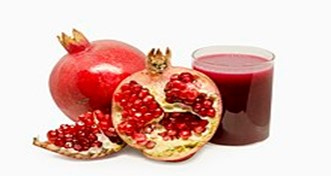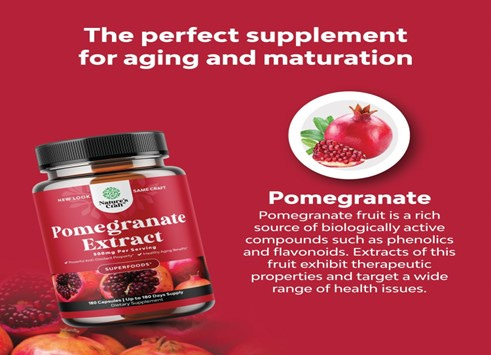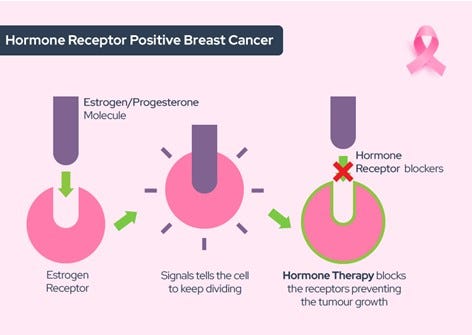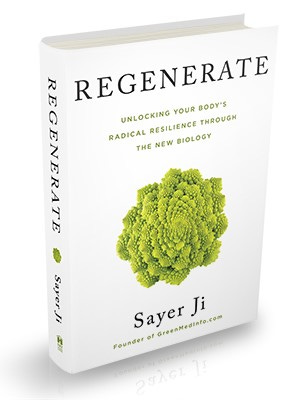As you know Pomegranate is quite a popular food, drink, and supplement these days. There have been some amazing claims around its use. Let us take a deep dive into Pomegranates and see what we can learn.
Punica granatum or the pomegranate plant has its origins in the Mediterranean region but has been taken by settlers all over the world, arriving in the United States along with Spanish settlers in 1769.
The name is derived from medieval Latin, “pomum” meaning apple and “granatum” meaning seeded. It grows as a shrub or small tree, 16 to 30 feet tall. Pomegranate has been used in Ayurvedic medicine for thousands of years, both the bark of the tree and the fruit.
In New Jersey during my childhood in the 1960’s, pomegranates were commonly referred to as Chinese Apples.
If you have ever seen a pomegranate, you can see why it got that name. They are visually beautiful, enticing fruit with their delicious red orbs bursting out of their flesh.
The pomegranate seeds are covered in a fleshy, transparent skin known as the aril. When the aril is broken it exudes a red juicy pulp. The juice is made by squeezing the seeds, not from any other part of the plant.
The seeds and the juice are both widely popular, and touted as being wonderful for our health. The fruit is high in vitamin C, but most of that is unfortunately lost when juicing it.
As with most fruit, eating the fruit of the plant raw and directly is much healthier for you. The reason being is that once you squeeze the juice out of any fruit, you are leaving behind a lot of fiber in the pulp and the skin which often contains healthy microbes such as wild fungi and bacteria.
The skin of the pomegranate is an exception to this rule since it is inedible. The juice has a high glycemic index and without being bound with fiber like it normally would be, results in spiking your blood sugar and in turn your insulin.
Insulin not only controls the entry of glucose into the cell, but also is a fat storage hormone, so any excess calories are directed into fat production. Which as we all know, is a virtual epidemic all over the world, but especially here in the United States.
It is disgusting how many young people I see who are morbidly obese, their muscles are underdeveloped, the boys have breasts, the girls all have bulging stomachs and love handles. I am referring to teenagers.
Imagine in thirty years what health problems these kids will have, after a life of no exercise, a diet that is a nutritional wasteland, no sun exposure, and decades of pharmaceuticals not to mention street drugs.
It does not take Nostradamus to predict how this is going to end for them. They have much bigger worries than their obsessions with climate change, white privilege, and transgender rights. But, alas once again I digress.
That being said, I am not saying that pomegranate juice is not healthy for you, I am just saying the fruit itself is preferable.
Besides the seeds and the juice of pomegranates, the peel is also made into an extract, and an oil is made from the seeds. Pomegranate powder is also available from which you can mix your own juice, a hell of a lot cheaper than buying it in juice form, but of course not as fresh. All of which seem to have medicinal qualities in common.
Pomegranate tea is also available. It is either made from crushed pomegranate seeds and/or flowers or is made by adding pomegranate juice to another tea.
Pomegranate seeds can be eaten alone or sprinkled on a salad. I was recently in Florida, and a humus plate came with pomegranate seeds, which added a great flavor to it, making it outstanding.
Pomegranate seeds contain two compounds that are very strong antioxidants: punicalagins and punicic acid. These are polyphenols, which are outstanding for your health.
UROLITHIN A (UA)
When you eat pomegranates some of the amazing health benefits are due to the production of Urolithin A. Urolithin A is produced by gut bacteria after digestion of certain foods high in my favorite class of compounds, the polyphenols. Urolithin A production thus occurs after eating berries, nuts, and most famously pomegranates.
Since Urolithin A is produced by good probiotic gut bacteria, it is considered a postbiotic. Postbiotics are compounds produced by probiotic material that have many health enhancing effects.
Many of the benefits of pomegranate are directly due to its effect on probiotic bacteria causing them to increase Urolithin A production. Urolithin A helps stimulate mitochondria function therefore increasing energy production, decrease inflammation, slows aging and age-related conditions, and anticancer properties.
Urolithin A’s most beneficial effects seem to be via its improvement in mitochondrial health and function. In studies this has been maintained across every species studied. Urolithin A also stimulates mitophagy, which is when the body naturally eliminates dying or dead mitochondria.
This process is very helpful and overall benefits the remaining mitochondria by stimulating their mitochondrial respiratory capacity (their activity).
Urolithin A also exhibits strong anti-inflammatory activity by decreasing COX-2 enzymes, cytokines, tumor necrosis factor, and interleukin levels. All of which are responsible for the body’s inflammatory response.
In some mouse models it has been shown to greatly improve Inflammatory Bowel Diseases such as ulcerative colitis and Crohn’s disease.
UA also helped degenerative spinal diseases by promoting collagen and proteoglycan production thus helping to make discs stronger, as well as joints, cartilage, and ligaments.
Collagen and proteoglycans are key components in the ECM or extracellular matrix, which is the material that lies between cells, in which they are embedded but many nutritious materials must pass across, and thru where wastes also are removed, hence, its health is vital to our health.
UA also protects the kidney after an acute injury and helps it to regain normal function.
UA has also been shown to be useful in increasing longevity, improving muscle strength and endurance, improving cardiovascular health, and prevention of arterial diseases.
Some of UA’s most impressive properties are its neurological effects. UA has been shown to protect the brain and nervous system in Alzheimer’s disease and other dementias. It improves memory, improves learning, and protects neurons (the cells of your brain and nervous system) from degeneration and death.
Urolithin A also has beneficial effects on the all-important gut microbiome, increasing levels of good probiotic bacteria by acting as a prebiotic (food for probiotic bacteria) such as bifidobacterial, and lactobacilli, while at the same time suppressing the growth of harmful bacteria such as clostridia.
UA also promotes the production of short chain fatty acids that directly provide energy to the gut lining, promoting good gut health, hence its beneficial effects upon inflammatory bowel diseases.
These same short chain fatty acids decrease gut inflammation, support probiotic (good) bacteria growth, thus supporting a healthy microbiome. The combination of feeding the gut lining and microbiome, decreasing inflammation, and inhibiting cellular damage by increasing mitochondrial health, all result in inhibition of the development of cancer.
When given in studies, the usual dose was between 1,000 mg to 2,000 mg (two grams) daily, it had a very good side effect profile with very few problems.
You can either eat pomegranate or its supplements and have your own gut bacteria convert it to Urolithin A, or you could take it as a supplement where it is actively absorbed in the colon. Some people who have had multiple courses of antibiotics may not be able to convert pomegranate to Urolithin A, and therefore would benefit from UA supplementation.
GROWING POMEGRANATE
From a gardening perspective, you can grow pomegranate in a surprisingly wide range within the United States. Here is a map of the continental United States, showing where you can grow pomegranate.
The plants are relatively inexpensive. You could always buy some seed as well and grow them from seed, or places like Etsy you can find inexpensive rooted cuttings. Just make sure they are a cultivar that will live in your growing zone as some are more tropical than others.
I am awaiting several cultivars of pomegranate for my Connecticut farm that I expect to arrive shortly. When you grow pomegranate, you must remember to leave the fruit on the tree until it is fully ripened, since picking it will interrupt any further ripening.
From a health point of view, nothing would be better than growing your own pomegranate. Having fresh, organic, delicious home-grown fruit is very rewarding. However, I realize that most people are either not in the position to grow their own pomegranate or just do not have the desire.
In these trying times, growing as much of your food/medicine is a very good idea, and has no downside to it, beyond the initial cost and the sweat equity you put into it. Growing enough of different types of food may very well save your life.
Pomegranate tree growing in an irrigated desert in Israel.
HOW THE MEDICAL UNDERGROUND USES POMEGRANATE
Overall, most of the time pomegranate is recommended as a supplement or a healthy alternative to other juices or fruit, due to its many health enhancing properties. Let us look at some of them:
Strong antioxidant properties, containing 3X the antioxidants of green tea or red wine. This is due to its high levels of flavonoids, polyphenols, tannins, catechins, gallic and ellagic acid, as well as vitamins A, C, and E, which are all antioxidants. This antioxidant activity helps prevent infections.
Helps promote a healthy Prostate.
Has anti-cancer properties: especially potent against breast, lung, prostate, and colon cancers. It is a known inhibitor of some carcinogens.
Stimulates the immune system.
Helps the Cardiovascular system, improves blood pressure, coronary artery disease, and atherosclerosis (hardening of the arteries). It reduces thick stiff arteries, lowers blood pressure, and improves overall cardiovascular health.
Helps prevent chronic disease states.
Lowers Bad Cholesterol and raises good HDL cholesterol.
Aids in Digestion, causes early fullness, and helps with weight loss.
Improves diabetes by lowering Insulin resistance. It has a very low glycemic index, meaning it does not spike blood glucose levels, keeping insulin levels low.
Is a good source of fiber, which helps with constipation.
Very high in Potassium, and a good source of other minerals such as calcium, copper, and manganese; fiber; and vitamins C, A, E, and K. Vitamin K2 is good for bone health. It is also high in B vitamins such as pyridoxine (vitamin B6), pantothenic acid (vitamin B5), and folic acid.
Pomegranate helps decrease cellular degeneration and premature aging.
Helps prevent the formation of Kidney Stones.
Pomegranates’ strong anti-inflammatory effects help improve arthritis, joint, and muscle pain, and increase muscle endurance and strength.
Enhances cognitive function from its stimulation of the production of Urolithin A by probiotic gut bacteria. Aids in the treatment and prevention of dementia, improving memory, learning, and protecting the brain and nervous system from degeneration.
Protects against excessive triglyceride deposition in the liver resulting in fatty liver. Helps overall metabolic health, decreases production of fat cells and overall fatty tissue production, thus it contributes to weight loss.
Women’s health is overall improved via its effect on hormones. Pomegranate helps to balance female hormonal health via its production of bioidentical steroid hormones such as estrone and testosterone, both of which are normally found in the ovaries. This helps with hot flashes and other menopausal symptoms.
Note: If you consider yourself a female, but were born a male, this will have no effect on you, because NEWS FLASH: YOU ARE NOT A WOMAN.
Side Effects of Pomegranate
Note: Caution should be taken if you are currently taking a class of blood pressure medications known as ace inhibitors such as Crestor for cholesterol and coumadin for anticoagulation, since pomegranate may interfere with the metabolism of these medications. Use it with caution and bring it to the attention of your physician.
The reason pomegranate might have adverse effects on the above medications, is by its inducement of enzymes in the liver that may inactivate or severely weaken their potency.
As for side effects of Pomegranate, they are few and far between. It may lower blood pressure in patients with hypertension due to its beneficial cardiovascular effects. As with any substance, it may cause an allergic reaction.
Drinking too much of the juice may elevate blood glucose in the short term, but overall, it has the opposite effect when used long term. Some of the tannins in it may lead to a rash on your hands. This too is very infrequent. Diarrhea has also been reported by some patients, albeit infrequently.
Cancer Prevention and Treatment Using Pomegranate
Pomegranate has many amazing benefits, but the one I find the most promising is its powerful anticancer properties, including both prevention and treatment of various cancers.
Pomegranate has been studied in its various forms, i.e., as a fruit, juice, extract, and oil, and the good news is that all its forms showed strong anticancer effects.
On PubMed there are many articles touting research of Pomegranate’s benefits in both cancer prevention and treatment. The mechanism for that appears to be multifactorial, including decreased inflammation, prevention of tumor growth and proliferation, and its positive effect on interrupting many of the cancer signaling pathways, preventing cancer growth, and spread.
Pomegranate has been shown to be of particular benefit in lung, skin, breast, prostate, and colon cancers.
In the case of breast cancer, pomegranate has been demonstrated to inhibit aromatase. Why is that so important? The reason is aromatase is the enzyme that converts androgens (male hormones) to estrogens (female hormones) in women.
The more estrogen around, in the case of estrogen breast receptors being positive, the more stimulus for cancer growth. The less estrogen around the less stimulus for breast cancer growth.
Note: This is only in patients who are estrogen receptor positive. Those who are estrogen receptor negative are not at risk.
I recently had a very rewarding case of a friend of mine’s daughter, who was found to have stage 3B invasive metastatic breast cancer. They were desperate to arrest this rapidly spreading cancer and give her some nutritional support for her upcoming chemo and radiation treatments.
I directed her to greenmedinfo.com, a website run by Sayer Ji, who provides a lot of research for alternative medicine compounds and their effects. It is a wonderful site and I highly recommend it, as well as his most recent book: Regenerate. It is a great, fascinating read, by a talented author.
She started a regimen of high dose antioxidant vitamins, including alpha lipoic acid, vitamin C, NAC, vitamin D, zinc, omega 3 fatty acids, B complex, and high doses of pomegranate extract, to the tune of over 11 grams a day. That has only been since July, and her doctors are astounded, despite the chemo and radiation, her complete blood count and chemistries are all normal and she appears to be responding amazingly to the pomegranate.
To their credit, they told her to continue my regimen, since it is working so well. Of course, these kinds of cases are only anecdotal. However, what did she have to lose? Nothing, and a whole lot of upsides if it worked, and thank God it has.
She is a wonderful girl from a very loving family and hopefully this will save her life. Will this turn out to be a cure for her, I do not know. It is too early to say, but so far, the results are very promising.
She also developed some severe unremitting headaches from her chemotherapy that was unresponsive to pain medications and did respond wonderfully to topical DMSO.
DMSO is a byproduct of the manufacturing of wood pulp, it stands for Dimethyl sulfoxide. That is certainly a tongue twister. It is produced when wood is processed into wood pulp. Workers using it noticed that their arthritic/joint aches miraculously disappeared.
It gained some notoriety in the 1980’s after being highlighted on Sixty Minutes, when its use started to become widespread. Big Pharma who profits from their pain killers became threatened. What happened next was a casebook example of what happens when government corruption/Big Pharma influence align.
Out of nowhere many states outlawed DMSO as only safe for animals, not safe for human use. Of course, that was the typical bullshit that we are constantly subjected to. It is perfectly safe for both animals and humans. Many states allowed it, and of course there were no problems, so how dangerous could it be. Does human physiology change from state to state?
I am going to write a paper on DMSO soon. Uggh, so many pressing subjects to cover for my readers, and so little time. I try to choose subjects that will both educate and entertain. Being a science geek, I love to take a deep dive into the particulars of how something works, while trying to not overwhelm my readers. However, once again I digress.
As always, I hope you found this article to be of interest to you, and hopefully you can apply it to your health needs or to someone you know and love. Please subscribe to the Medical Underground so you can stay abreast of the latest research, and learn the cures that no one knows about.
Please consider becoming a paid subscriber. It is only a few bucks a month. We must support the things we believe in, to keep this knowledge available.
May God Bless You and Your Family, and the United States of America.
And always remember, for those who believe, “Miracle Shall Follow Miracle and Wonders Shall Never Cease”.
This disclaimer provides that such medical information is merely information – not advice.
If users need medical advice, they should consult their doctor or other appropriate medical professional.
***Copyright © 2023 by Dr. Ralph La Guardia, MD
All rights reserved. This article or any portion thereof
may not be reproduced or used in any manner whatsoever
without the express written permission of the publisher
except for the use of brief quotations in an article review.














Its in my lineup of upcoming articles, so many subjects that I want to write about, and just so many hours in the day. Thanks Jonathan.
I agree , A Chinese apple a day, is probably a lot healthier..LOL. Doc